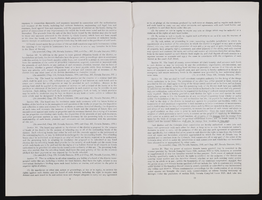Search the Special Collections and Archives Portal
Search Results
An Interview with Judith Lee Johnson Jones
Identifier
Abstract
Oral history interview with Judith Lee Johnson Jones conducted by Claytee D. White on February 22, 2007 for the Boyer Early Las Vegas Oral History Project. Johnson Jones discusses winning a contest that allowed her to be a showgirl at the Sands Hotel and Casino when she was seventeen, receiving a college degree in Houston, Texas, and performing in the Elvis movie “Viva Las Vegas.” She also talks about her twenty-nine-year career in education.
Archival Collection
Jacqueline MacFarlane oral history interview
Identifier
Abstract
Oral history interview with Jacqueline MacFarlane conducted by Claytee D. White on February 04, 2010 for the Boyer Early Las Vegas Oral History Project. In this interview Jacqueline MacFarlane discusses her early childhood in Las Vegas, Nevada, her move to rural Nevada because of the Great Depression, her move back to Las Vegas, and meeting her husband David MacFarlane, an Air Force Cadet, at the Nellis Air force Base. She then discusses family life, Las Vegas in the 1950s and 1960s, and the various jobs she held on the Las Vegas Strip.
Archival Collection
Harriet Barlow oral history interview
Identifier
Abstract
Oral history interview with Harriet Barlow conducted by Elsha Harris-Tolanda on April 27, 2015 for the African Americans in Las Vegas: a Collaborative Oral History Project. In this interview, Barlow discusses her personal history and growing up in Robbins, Illinois. She talks about her education, discrimination in schools, and the process of school integration. Barlow then recalls her first impressions of Las Vegas, Nevada and her employment at the University of Nevada, Las Vegas. Lastly, Barlow describes going through graduate school as an African American and explains why conversations about race relations can be difficult.
Archival Collection
Charles Roland oral history interview
Identifier
Abstract
Oral history interview with Charles Roland conducted by Claytee D. White on August 16, 2012 for the African Americans in Las Vegas: a Collaborative Oral History Project. Roland begins by describing why his family moved to Las Vegas, Nevada in 1952 and attending Las Vegas High School. He discusses the African American community in Las Vegas, working in a restaurant called Sill's Drive-In, and his father, who opened the Hamburger Heaven restaurants. Roland also discusses race relations in Las Vegas prior to integration, the Binion family, and how Las Vegas has changed.
Archival Collection
Helen Smith oral history interview
Identifier
Abstract
Oral history interview with Helen Smith conducted by Claytee D. White on February 20, 2007 for the Boyer Early Las Vegas Oral History Project. In this interview, Smith discusses her personal history and moving to Las Vegas, Nevada in 1956. She then talks about her employment at Southern Nevada Memorial Hospital and the change to University Medical Center (UMC). Smith recalls an air conditioning business she co-owned with her husband at the time, and the activities she did as a member of Daughters of the Nile, a women's community service organization. Lastly, she discusses education and the general changes in Las Vegas.
Archival Collection
Jinetta Daniels oral history interview
Identifier
Abstract
Oral history interview with Jinetta Daniels conducted by Rani Dunn on November 30, 2014 for the African Americans in Las Vegas: a Collaborative Oral History Project. In this interview, Daniels talks about her upbringing in Mississippi and traveling to Las Vegas, Nevada by bus in 1962. She continues discussing her work as a maid at the Dunes Hotel, her membership in the Victory Baptist Church, and comments on various church and community leaders in the Westside. She also mentions her concerns about the closure of F Street in 2008 and her hopes for the revitalization of the Westside community.
Archival Collection

Transcript of interview with Lori Chenin-Frankl by Barbara Tabach, June 7, 2016
Date
Archival Collection
Description
Lori provides a wonderful narrative of her Judaism, her love of teaching children and her devotion to family and music. She talks about growing up in Las Vegas and becoming a bat mitzvah, a rarity for girls in 1973. Throughout her life, including the period where she moved around with her Air Force husband, she sought Jewish connections to help her feel at home no matter where she was.
Text

Film strip of individuals or Hoover Dam construction, image 007: photographic print
Date
Archival Collection
Description
Image
Stephen Nasser Papers
Identifier
Abstract
The Stephen Nasser Papers (1992-2018) mainly contain letters written from school children to Nasser who travels to schools, churches, and organizations around Las Vegas, Nevada to share his story of surviving the Holocaust during World War II. Materials in this collection document his captivity in various prison camps and includes photographs, awards, and newspaper clippings. Also included are speeches given by Nasser and book reviews and a teacher's guide of his book My Brother's Voice written by students of Dixie College, St. George, Utah. This collection includes a copy of
Archival Collection

